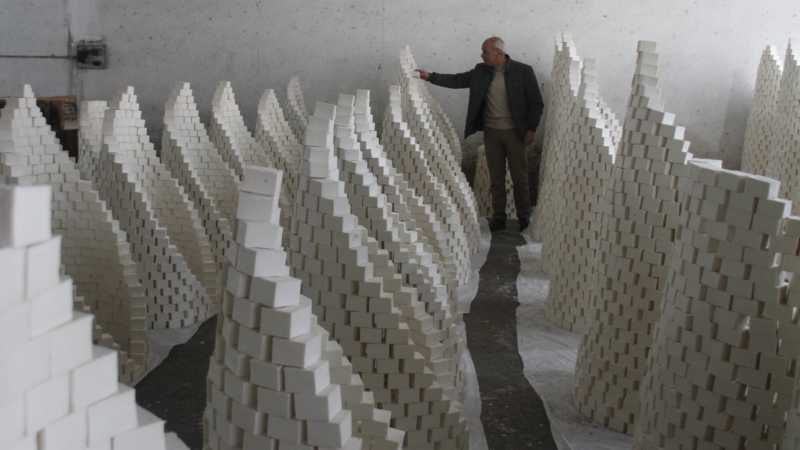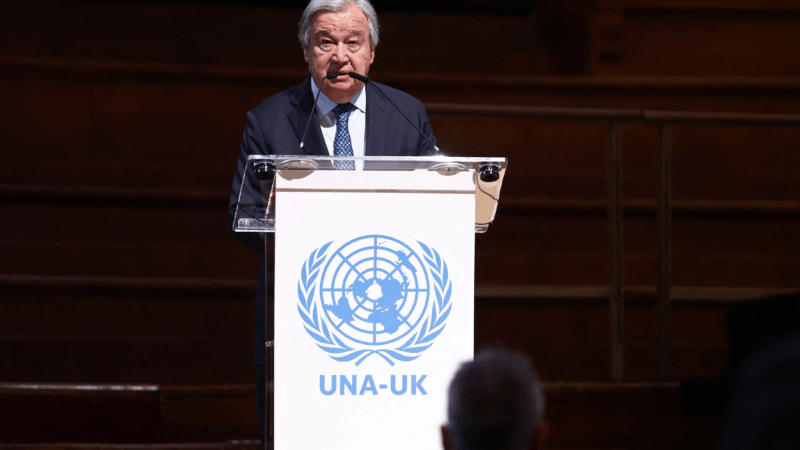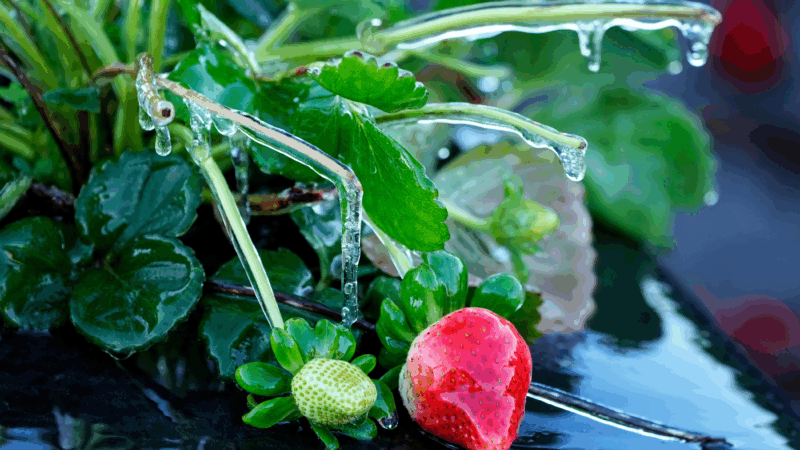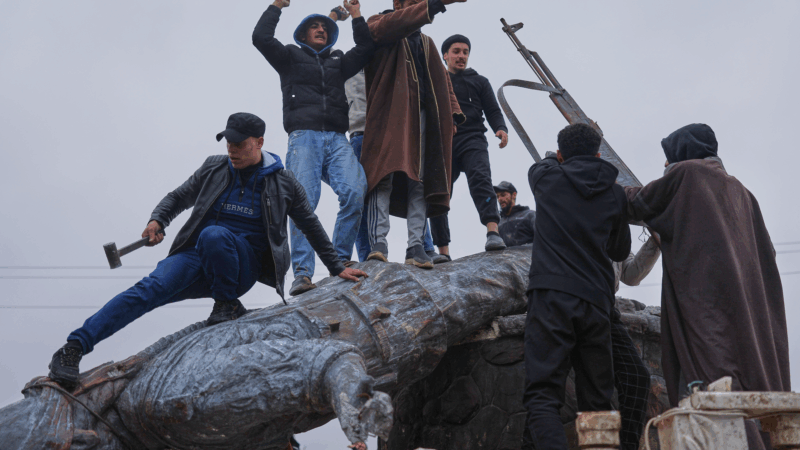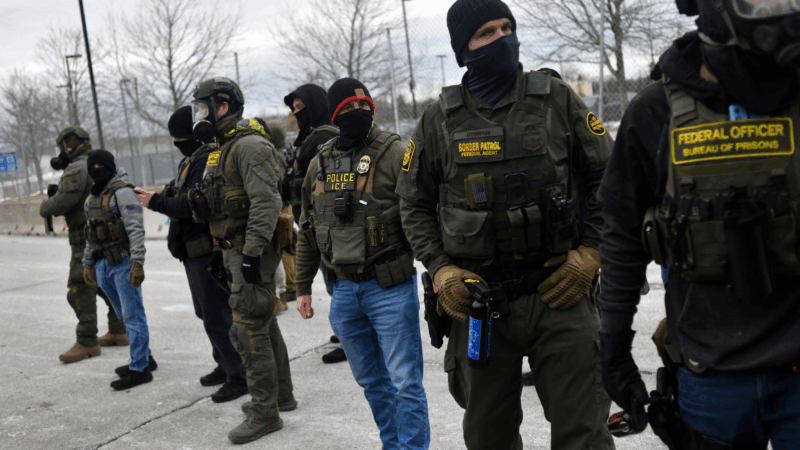Palestinian soap gets UNESCO recognition as Israel’s military operation closes in
NABLUS, West Bank — As the sun starts to come up over the old city of Nablus, workers light a giant blaze of a furnace at the Touqan soap factory right off the main square. The blasting flames start to slowly heat a giant vat holding hundreds of gallons of goopy, waxy sludge above. It’s a morning ritual that’s been happening at the factory for more than 150 years.
Musa Assakhal scrapes a metal spatula through the mixture — a combination of virgin olive oil, water and lye — checking the consistency. He flips a switch and a big metal blade starts slowly rotating, gently sloshing the thick liquid onto the surrounding surfaces as it mixes. It’s been boiling on and off for several days.
“I’m waiting for it to boil,” he says. “Once it boils, I’ll know whether it’s ready or not.”
Assakhal has been doing this job for most of his life. His father had the job before him. He used to sometimes come and help when he was a child.
“This job gives me great joy, to be able to do something the way my ancestors did it,” he says, smiling.
The Palestinian city of Nablus has been known for its olive oil soap for centuries, the tradition of making it passed down from generation to generation. In December, the tradition was added to the list of UNESCO Intangible Cultural Heritage, after Palestinian representatives nominated it.

While many families make it in their homes, Touqan, opened in 1872, is one of the oldest factories still in operation. But workers at the factory say that business has slowed, as competition from global brands has increased, but also as the Israeli military occupation of the West Bank has put more and more impediments on owning and operating a business. In recent years, they’ve had to cut staff, and production has decreased by about a third.
In January, Israel launched a new and destructive military operation in the northern part of the West Bank, which it says is for counterterrorism. The operation has displaced tens of thousands of Palestinians from their homes, with forces destroying hundreds of residential buildings, according to the Israeli military, saying the destruction was an “operational necessity.” It has also made the neighborhoods it has focused on unlivable, according to the United Nations, ripping up streets and necessary infrastructure.
The military activity has slowly spread south. On March 21, the Israeli military announced it had begun operating in Nablus, conducting near daily raids in the city.
“We’re living now through the worst military obstacles on the roads leading to where our soap needs to reach our customers,” says Nael Qubbaj, the manager of manufacturing at the factory for the past 30 years.
He says the roadblocks, checkpoints and raids that are part of the Israeli military occupation over the past decades have made it increasingly difficult for the factory to operate. Now, the stepped-up military activity has made it worse. Sometimes workers can’t get to work, or soap shipments can’t get delivered.

The day before NPR visited, the Israeli military raided the old city of Nablus, for what it said was counterterrorism purposes, shooting several people. The factory kept operating, but it’s disruptive and dangerous, says Qubbaj.
So, he adds, getting recognized by the U.N. cultural agency at a difficult time like this makes it all the more special. While UNESCO’s well-known World Heritage List includes important sites around the world, its Intangible Cultural Heritage of Humanity category designates different cultures’ products and customs — like sake from Japan, for example.
“In view of this siege, all this political unrest, all this oppression against the Palestinian people, a UNESCO recognition of our soap brings not only pride, but it is a celebration of many years of working on this soap,” he says. “We want to keep this legacy alive.”
The top floor of the factory is a wide open room, with slick cement floor. When the consistency of the soap mixture downstairs is ready — usually after a week of boiling on and off — porters carry it up the stairs in metal buckets, one after another, spreading it on the floor to harden.
Then it’s cut into bars using long pieces of thread, and stacked in high cylindrical towers to dry for about three months.
The final step in the process can be heard from the next room, a very rhythmic flutter. Men sitting on the ground, surrounded by bars of soap, wrap each bar by hand in the company’s signature white paper packaging stamped with blue Arabic lettering and two red keys, atop small wooden tables perched in front of them. It’s mesmerizing to watch.
Floor manager Sultan Qaddura stands nearby, laughing with one of the wrappers as they work. He says that many of them can wrap around a thousand bars an hour.
“We call this soap the white gold of Nablus,” he says with a smile. Quddura has also been working at the factory for decades, as have most of the men wrapping.
He says the UNESCO recognition has made them all very, very proud. “We work so hard to preserve this history. It’s not just soap, it’s part of our identity,” he says.

Downstairs the soap has just started to boil, with big, heavy bubbles slowly rising to the surface.
Musa Assakhal expertly checks the consistency.
“It’s almost there,” he says.
Tomorrow, he says the porters will come and carry it upstairs. And then a new batch will be mixed, so the process can start all over again, just like it has for more than 150 years.
Nuha Musleh contributed to this report from Nablus, West Bank.
Transcript:
AILSA CHANG, HOST:
Three simple ingredients – olive oil, water and lye – have been combined for centuries to make soap in the Palestinian city of Nablus in the Israeli-occupied West Bank. The city has become known for it. The tradition has passed down from generation to generation, and recently, it was added to UNESCO’s list of intangible cultural heritage. NPR’s Kat Lonsdorf visited one of the oldest soap factories and brings us this report.
(SOUNDBITE OF CAR HORN BEEPING)
KAT LONSDORF, BYLINE: It’s around 7 a.m., and the old city of Nablus is waking up for the day, including at the Tuqan Soap Factory, right off the main square, where a powerful furnace has just been lit – the flames blasting, heating a giant vat of hundreds of gallons of waxy liquid above it. It’s a morning ritual that has been happening here for more than 150 years.
(SOUNDBITE OF SPATULA BANGING)
LONSDORF: Musa Al-sakhal scrapes a metal spatula through the mixture, which has been boiling on and off for several days, checking the consistency. He flips a switch, and a big metal blade starts mixing it, sloshing the thickening goop onto surrounding surfaces. Al-sakhal has been in charge of this process, cooking the soap, for 45 years.
MUSA AL-SAKHAL: (Speaking Arabic).
LONSDORF: He says his father had the job before him.
AL-SAKHAL: (Speaking Arabic).
LONSDORF: “It’s a job that gives me joy,” he says, “doing something the way my ancestors did it.”
There used to be dozens of soap factories like this in Nablus. Now there are only a few. This one, Tuqan, is one of the oldest, open since 1872.
NAEL QUBBAJ: We are producing soap using our traditional way.
LONSDORF: Nael Qubbaj has been managing operations for more than 30 years. He says here at the factory, barely anything has changed. I ask if the same can be said for outside the factory, in Nablus and in the West Bank.
QUBBAJ: (Laughter).
LONSDORF: And he just laughs. He switches to Arabic.
QUBBAJ: (Speaking Arabic).
LONSDORF: “Over the past three decades,” he says, “we have had to deal with increasing military impediments,” referring to the roadblocks, checkpoints and raids that are part of the Israeli military occupation here. “It’s hard for life,” he says, “but it’s also hard for business.”
QUBBAJ: (Speaking Arabic).
LONSDORF: People sometimes can’t get to work, or product can’t be delivered. The day before our visit, the Israeli military raided the old city of Nablus as part of what it calls an extended counterterrorism operation in the West Bank. The factory kept operating, but it’s disruptive and dangerous, says Qubbaj.
QUBBAJ: (Speaking Arabic).
LONSDORF: They’ve had to lay off workers, and production has decreased by about a third.
QUBBAJ: (Speaking Arabic).
LONSDORF: “But we want to keep the legacy alive,” he says.
(SOUNDBITE OF FOOTSTEPS)
LONSDORF: We head upstairs with assistant manager Sultan Qaddura.
SULTAN QADDURA: (Speaking Arabic).
LONSDORF: The top level is a wide open room with a slick cement floor.
QADDURA: (Speaking Arabic).
LONSDORF: When the soap mixture is ready, after about seven days of boiling, porters carry it up here in metal buckets, spreading it on the floor to harden. Then it’s cut into bars using long pieces of thread. Those bars are then stacked in high towers throughout the room to dry for three months. The final step in the process can be heard from the next room, a rhythmic flutter.
(SOUNDBITE OF PAPER RUSTLING)
LONSDORF: Men sit on the ground, surrounded by bars of soap, wrapping each one by hand in paper.
(SOUNDBITE OF PAPER RUSTLING)
LONSDORF: Qaddura says they can wrap about 1,000 bars per hour.
QADDURA: (Speaking Arabic).
LONSDORF: “We call this soap the white gold of Nablus,” Qaddura says with a smile. I ask what he thinks about the UNESCO recognition.
QADDURA: (Speaking Arabic).
LONSDORF: “We’re really proud,” he says.
QADDURA: (Speaking Arabic).
LONSDORF: “We work so hard to preserve this history. It’s not just soap,” he says, “it’s part of our identity.”
Kat Lonsdorf, NPR News, Nablus.
(SOUNDBITE OF MUSIC)
High-speed trains collide after one derails in southern Spain, killing at least 21
The crash happened in Spain's Andalusia province. Officials fear the death toll may rise.
United Nations leaders bemoan global turmoil as the General Assembly turns 80
On Saturday, the UNGA celebrated its 80th birthday in London. Speakers including U.N. Secretary-General António Guterres addressed global uncertainty during the second term of President Trump.
Parts of Florida receive rare snowfall as freezing temperatures linger
Snow has fallen in Florida for the second year in a row.
European leaders warn Trump’s Greenland tariffs threaten ‘dangerous downward spiral’
In a joint statement, leaders of eight countries said they stand in "full solidarity" with Denmark and Greenland. Denmark's Prime Minister Mette Frederiksen added: "Europe will not be blackmailed."
Syrian government announces a ceasefire with the Kurdish-led Syrian Democratic Forces
Syria's new leaders, since toppling Bashar Assad in December 2024, have struggled to assert their full authority over the war-torn country.
U.S. military troops on standby for possible deployment to Minnesota
The move comes after President Trump again threatened to invoke the Insurrection Act to control ongoing protests over the immigration enforcement surge in Minneapolis.

